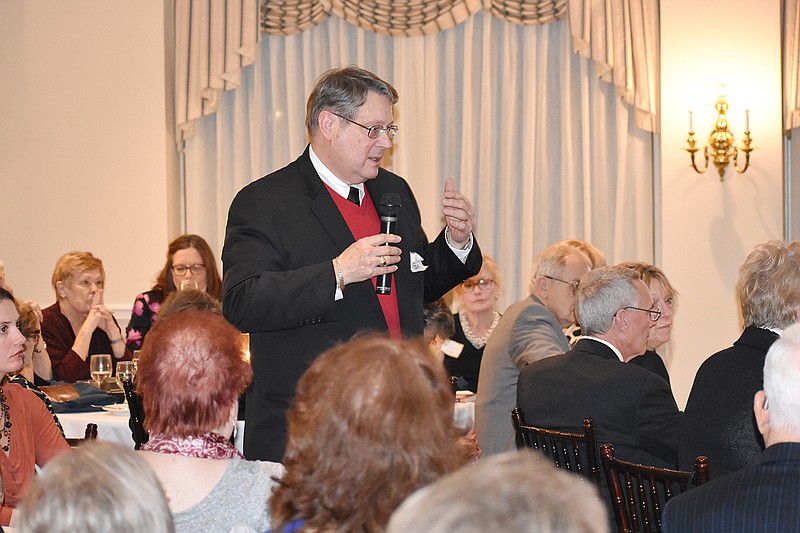As a Missouri governor, Thomas Clement Fletcher may be all but forgotten by the general public.
However, on Sunday evening, author Stephen Huss described Fletcher as a fascinating character who played a huge role in the state's history. Fletcher was elected as a war hero, and worked to bring Missourians back together and patch the state's huge scars at the end of the Civil War.
Huss, a historian and professor in American studies, was the speaker at the Cole County Historical Society's annual dinner Sunday at the Jefferson City Country Club. Huss is the author of "Rediscovering Thomas C. Fletcher: The Lost Missouri Governor."
Huss said Missouri was devastated by the Civil War with many small skirmishes, and divisions in the state ran deep.
"What most people were not aware of is how incredibly devastated the State of Missouri was," he said. Missouri, in many ways, had it worse than other states, he said.
"Rebels were burning and pillaging," he said, adding Confederate irregulars were terrorists. "They cut people's heads off and put them on posts," he said.
Railroads and bridges were mostly inoperable. War dead were thrown in mass graves, leaving their loved ones no closure, he said.
By the time Fletcher was elected Jan. 2, 1865, more than one-third of the state's population had left.
"Essentially, in January of '65, Missouri resembled modern Afghanistan in its uncertainty, violence, threats to its citizenry, poor economy and devastated culture, and this is not an exaggeration," he said.
Fletcher was elected governor as a war hero, but he was unknown to a lot of people.
As a youth, witnessing a slave sale scarred Fletcher, making him determined to not allow slavery to continue.
His inaugural address included the line: "Let us, forgetful of our past differences, seek only to promote the general good of the people."
Among his first actions were maintaining federal troops in the state and creating a state militia, which Fletcher believed was a key to free elections.
Fletcher sought to bring the state together, while the Missouri Legislature wanted to punish Confederate supporters, Huss said.
Fletcher was the first governor to sign the emancipation proclamation.
Fletcher was concerned about the African-American population after the war. Former slaves had difficulty with food, shelter and other necessities.
Huss said Fletcher was the first president of the Board of Trustees for Lincoln University.
"He developed the financial stability of the state government, he increased their property tax, used federal money whenever he could. The state value of property rose from $2 million to $5 million," Fletcher said. He eliminated the state's debt and created a surplus.
In education, his administration oversaw the addition of 5,000 teachers, 4,000 schools and the creation of the university system.
The railroad system was rebuilt. "Every single railroad ran after Fletcher was governor," Huss said.
Fletcher also improved agriculture tremendously, and brought immigrants into the state, as workers were desperately needed.
As a private citizen, after serving as president of the board of trustees, he practiced before the U.S. Supreme Court, and worked on behalf of veterans and Native Americans.
Huss said he was inspired to write about Fletcher after reading a national newspaper article in the 1800s that described Fletcher walking hand-in-hand with his wife from one park to another.
"I thought, 'This is amazing. To have this kind of a man, and people not know who he is, not recognize the things he has done.'"

